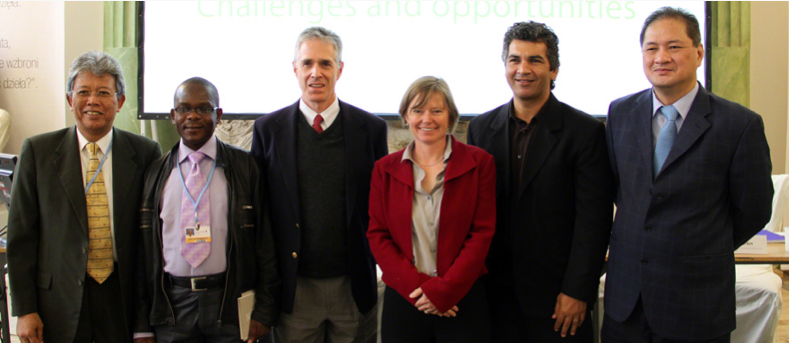The Center for International Forestry Research (CIFOR) organized ‘Getting REDD+ Off the Ground: Challenges and Opportunities,' which focused on Reducing Emissions from Deforestation and Forest Degradation, and the Role of Conservation, Sustainable Management of Forests and Enhancement of Forest Carbon Stocks in Developing Countries (REDD+)' on the sidelines of the Warsaw Climate Change Conference.
 15 November 2013: The Center for International Forestry Research (CIFOR) organized ‘Getting REDD+ Off the Ground: Challenges and Opportunities,’ which focused on Reducing Emissions from Deforestation and Forest Degradation, and the Role of Conservation, Sustainable Management of Forests and Enhancement of Forest Carbon Stocks in Developing Countries (REDD+)’ on the sidelines of the Warsaw Climate Change Conference.
15 November 2013: The Center for International Forestry Research (CIFOR) organized ‘Getting REDD+ Off the Ground: Challenges and Opportunities,’ which focused on Reducing Emissions from Deforestation and Forest Degradation, and the Role of Conservation, Sustainable Management of Forests and Enhancement of Forest Carbon Stocks in Developing Countries (REDD+)’ on the sidelines of the Warsaw Climate Change Conference.
Moderated by Antonio La Viña, Ateneo School of Government of the Philippines, the panel consisted of representatives from NGOs such as the Nature Conservancy; Climate, Community and Biodiversity Alliance (CCBA); Tanzania Forest Conservation Group, Instituto Centro de VIDA (ICV), and research centers such as CIFOR and the Philippines’s Ateneo School of Government. La Viña stressed that REDD+ practice has progressed faster than corresponding policy.
Joanna Durbin, CCBA, underscored that REDD+ should be approached as a development opportunity rather than as a service to others. She outlined the safeguards that should be promoted and supported when undertaking REDD+ activities. Durbin concluded that some REDD+ challenges can be addressed through a transparent process to address safeguards. This along with multiple benefits arising from REDD+ may transform REDD+ into an opportunity to support locally-defined development objectives.
William Sunderlin, CIFOR, presented preliminary findings of a CIFOR study, which found that the main pressures on forests include small-scale traditional agriculture, illegal timber harvest, and frontier agriculture, well ahead of their large-scale equivalents. He also discussed the relative importance of interventions and ranking of factors that affect implementation, concluding that it remains to be seen if REDD+ can surmount challenges and become fundamentally different from integrated conservation and development projects.
Renato Farias, Instituto Centro de VIDA (ICV), Brazil, provided insight from the “Cotriguaçu Sempre Verde” project, in the region of Mato Grosso, Brazil. He underlined the need to prepare the research team internally to deal with different stakeholders, as well as to work separately with each one to produce concrete results and develop trust.
Charles Meschak, Tanzania Forest Conservation Group, offered the Tanzanian experience of implementing REDD+. He sketched a number of challenges, underscoring the value of establishing a performance-based model, which channels revenues from the voluntary market directly to the communities. He also stressed the importance of involving multiple stakeholders in the design and implementation of the project.
Wahjudi Wardojo, The Nature Conservancy (TNC), Indonesia, presented on the Berau Forest Carbon Programme in Indonesia. Noting pressures and challenges, he underlined the need to: create appropriate financial incentives to support low carbon development; support district government agencies through technical assistance; and help build the capacity of local NGOs and communities. [IISD RS ENBOTS coverage][IISD RS video coverage]